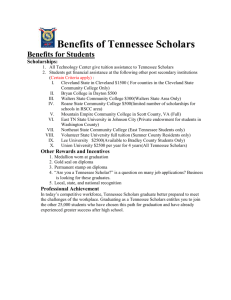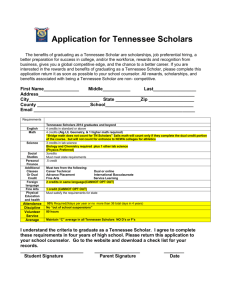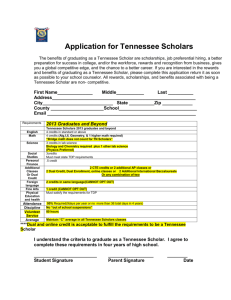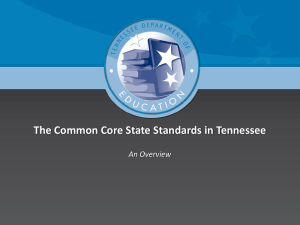White Paper
advertisement
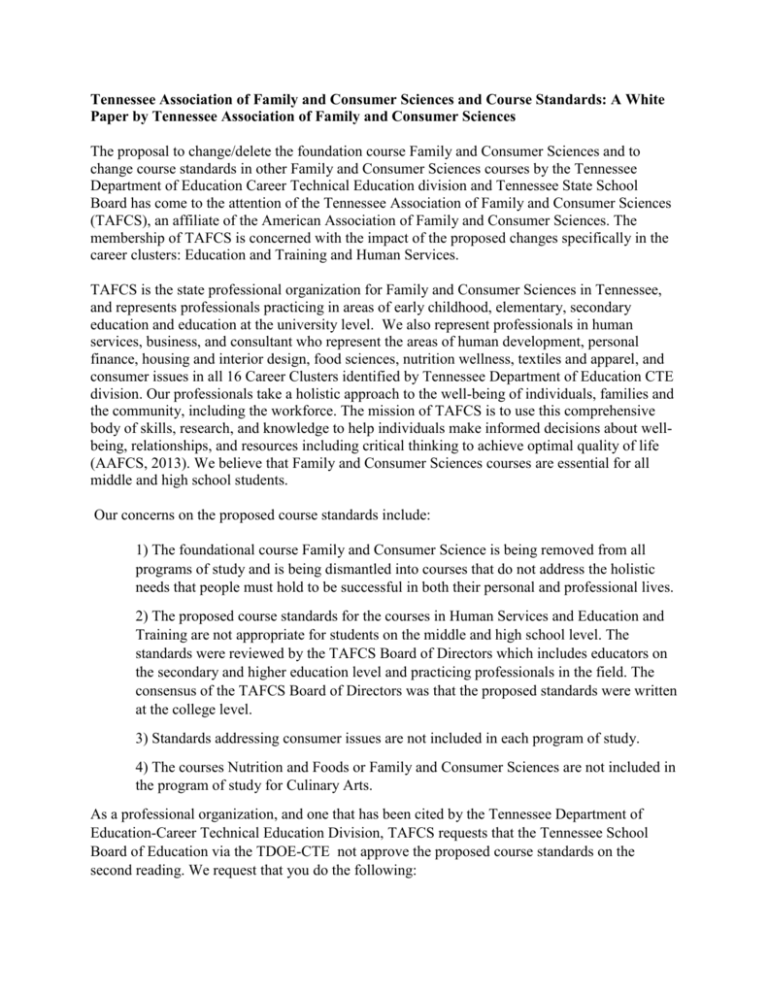
Tennessee Association of Family and Consumer Sciences and Course Standards: A White Paper by Tennessee Association of Family and Consumer Sciences The proposal to change/delete the foundation course Family and Consumer Sciences and to change course standards in other Family and Consumer Sciences courses by the Tennessee Department of Education Career Technical Education division and Tennessee State School Board has come to the attention of the Tennessee Association of Family and Consumer Sciences (TAFCS), an affiliate of the American Association of Family and Consumer Sciences. The membership of TAFCS is concerned with the impact of the proposed changes specifically in the career clusters: Education and Training and Human Services. TAFCS is the state professional organization for Family and Consumer Sciences in Tennessee, and represents professionals practicing in areas of early childhood, elementary, secondary education and education at the university level. We also represent professionals in human services, business, and consultant who represent the areas of human development, personal finance, housing and interior design, food sciences, nutrition wellness, textiles and apparel, and consumer issues in all 16 Career Clusters identified by Tennessee Department of Education CTE division. Our professionals take a holistic approach to the well-being of individuals, families and the community, including the workforce. The mission of TAFCS is to use this comprehensive body of skills, research, and knowledge to help individuals make informed decisions about wellbeing, relationships, and resources including critical thinking to achieve optimal quality of life (AAFCS, 2013). We believe that Family and Consumer Sciences courses are essential for all middle and high school students. Our concerns on the proposed course standards include: 1) The foundational course Family and Consumer Science is being removed from all programs of study and is being dismantled into courses that do not address the holistic needs that people must hold to be successful in both their personal and professional lives. 2) The proposed course standards for the courses in Human Services and Education and Training are not appropriate for students on the middle and high school level. The standards were reviewed by the TAFCS Board of Directors which includes educators on the secondary and higher education level and practicing professionals in the field. The consensus of the TAFCS Board of Directors was that the proposed standards were written at the college level. 3) Standards addressing consumer issues are not included in each program of study. 4) The courses Nutrition and Foods or Family and Consumer Sciences are not included in the program of study for Culinary Arts. As a professional organization, and one that has been cited by the Tennessee Department of Education-Career Technical Education Division, TAFCS requests that the Tennessee School Board of Education via the TDOE-CTE not approve the proposed course standards on the second reading. We request that you do the following: 1) Reestablish the course Family and Consumer Sciences as the foundational course for our various programs of study in career clusters. This course provides each student with knowledge to live effectively as individuals, have a functioning family life, and be an effective member of the community and work force. Including the foundation course in all programs of study ensures that the Perkins IV guidelines of career success will be successful. To prepare students for success in the job market, “soft skills” are necessary (Lazerus, 2013). The foundation course of Family and Consumer Sciences includes content on relationships, communication, family and interpersonal relationships, decision making, goals, and self-reflection. All of these are skills needed to be successful in the work force. Furthermore, this course provides a seamless transition to university programs and a link to our professional organization which provides research based knowledge and strategies for individual and family success. 2) Revise the proposed course standards in Human Services and Education and Training to be more appropriate for secondary education. The proposed changes were made to make the program more rigorous. TAFCS is not opposed to rigor. However, if the course standards have no relevance to the students, and are above the academic level of high school students, then learning cannot occur or at best will be limited. As an association of professionals, we recognize the value of integrating math, science, history, government, composition, and reading into the curriculum. Furthermore, Family and Consumer Sciences courses reinforce the theories, principles, and practices of the basic academic courses of math, social studies, science, reading and writing. Family and Consumer Sciences courses tie these domains of knowledge together in an integrated manner to address the knowledge and practical skills needed by students. When considering the two requests, TAFCS would like the Tennessee State Board of Education to be aware of the following facts: 3) Tennessee ranks second in bankruptcy (Hieb, 2010). The lack of financial literacy is of major concern for TAFCS. In Tennessee, students take 12 years of language arts; yet, speaking and writing correctly remains a challenge for many. How are individuals expected to become financially literate with a one semester course in personal finance? The foundational course Family and Consumer Sciences as it is currently written addresses this issue with students. We also feel that it should be included in the Nutrition and other programs of study that include Family and Consumer Sciences content. 4) Tennessee ranks fifth in the nation in obesity (Children’s Health Crisis, 2012). This problem not only threatens the health of the citizens in our state resulting in increased healthcare costs and decreased work output; but it negatively impacts our state's economy. Foods and Nutrition should be at least a one semester required class, where students not only learn about nutrition but how to retain nutrients through healthy food preparation methods and make healthy choices when shopping and dining out. This would have a direct impact on money spent on healthcare by the government and long term health of both individual and families. Thank you for considering the above request and giving thought to two of the major issues facing the citizens of our state. The impact of honoring the requests will abate further erosion of individuals and families. Long-term, there will be stronger and more cohesive family units and citizens with interpersonal and other soft skills necessary to secure, hold jobs, and have successful careers. Finally, without courses such as Family and Consumer Sciences, we are depriving the students of Tennessee classes that will educate them in ways to become more financially stable and ways to live healthier lives; thus doing nothing to reverse Tennessee’s statistics of ranking second in the nation in bankruptcy and third in obesity. For these reasons, we are concerned that if these issues are not addressed, the quality of life for individuals in the state of Tennessee will be negatively impacted. References Children’s Health Care Crisis (2013). Childhood obesity rates in Tennessee. Retrieved on November 11, 2013 from www.wnpt.org. Hieb, D. (2010). Tennessee has second highest bankruptcy rate. Nashville Business Journal. Retrieved November 11. 2013 from www.bizjournalscom. Lazerous, A. (2013).Soften up: The importance of soft skills for success. Physician Executive Journal. Retrieved November 11, 2013 from www.pej-acpe.org.
